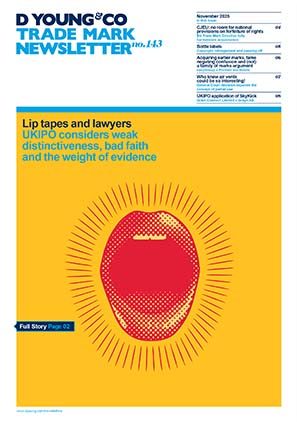Non-use revocation of “TRUE NORTH” - victory for the small fish in a big pond
A rural Scottish salmon company facing non-use revocation, retained its registration for salmon and related goods, representing at least a partial win for small rural businesses with only local and seasonal sales. Whilst no singular piece of evidence was decisive, genuine use was inferred by piecing together various pieces of evidence to form a complete “evidential picture”.
The UKIPO confirmed in its decision of 21 December 2021 that a relatively small amount of use of TRUE NORTH in a local deli and restaurant is sufficient for genuine use.
This decision reiterates the fact that there is no de minimis rule and that a global assessment should look at the evidential picture as a whole, rather than assessing whether each individual pieces of evidence showed use by itself.
Background
In 2015, Scottish Seafood Investments Limited (the proprietor) registered the word mark TRUE NORTH for various salmon and fish related products in class 29. A non-use revocation action was filed by Cooke Aquaculture Scotland Limited (applicant for revocation) in 2020.
Half of the proprietor’s publically disclosed evidence related to sales of TRUE NORTH branded salmon in its subsidiaries deli-style shop and the other half related to sales of branded meals in the subsidiary’s oyster bar restaurant, both located in rural North West Scotland.
Use in a variant form
The majority of the evidence featured the following logo mark:

The question is whether the figurative logo shown above constituted use in an acceptable form to evidence use of the plain word mark TRUE NORTH. The hearing officer addressed this point first; finding that, on balance, the words TRUE NORTH were “clearly present and obvious” in the logo mark and the distinctive character of the word mark was not affected to any significant degree by its use within the variant logo form.
However, the hearing officer remarked that the issue was “finely balanced” but noted that the applicant for revocation had not challenged the use of the logo form. Therefore, this seems to have been taken this into consideration.
Use as a trade mark
The applicant did, nevertheless, criticise the evidence of use of the mark on menus with a meal labelled “True North Lightly Smoked Salmon”, arguing that the words “True North” were presented in the same font and size as the other words on the menu and no trade mark identifiers were present.
The hearing officer disagreed, stating that the average consumer is likely to appreciate that “True North” should be perceived as a brand name. The lack of a registered trade mark symbol ® did not detract from this.
Geographical scope
The applicant also argued that the sales appeared to have only been made through one shop in rural North West Scotland. They contextualised this within the entire UK-wide market, arguing that it was geographically insignificant. However, the hearing officer found that the location and rural nature of the establishments did not alter the evidence of genuine use.
Extent of use
The hearing officer accepted the applicant’s arguments that the initial sales run appeared to be “fairly small in size”. However, they reiterated: “there is no de minimis rule and a global assessment should look at the evidential picture as a whole, rather than assessing whether each individual piece of evidence showed use by itself.”
This global assessment allowed the proprietor to work around some otherwise valid criticisms of the evidence. For example, the menus were undated and till receipts and summaries referred to “lightly smoked”/ “roasted salmon”, instead of “True North”. However, the hearing officer cross-referenced the two exhibits to infer use of TRUE NORTH on meals sold during the relevant period.
Whilst the proprietor did not submit traditional annual sales figures or advertising spend; one of the witnesses provided estimates based on monthly sales. Additionally, they filed a “Brand Review” document which set out the promotion, development and launch of TRUE NORTH branded products across the relevant period. From this, the hearing officer inferred that the proprietor intended to promote and raise awareness of the brand from the business proposals, and inferred that activities were ongoing throughout the relevant period.
The hearing officer concluded that the proprietor had shown sales of TRUE NORTH products in the shop in 2015 and 2016. This, combined with the sales of True North meals in its restaurant, proven in evidence during 2016, and claimed to have been offered seasonally between 2016 and 2019, was sufficient to establish genuine use.
Relevant goods
All evidence filed related to salmon products only. The hearing officer considered that this is a market which “will likely be a specific, niche endeavour unlike for example, trawler fishing, by which any manner of fish… may be brought in within a single haul”; concluding that salmon was the only key area of interest of the proprietor.
Consequently, the revocation action was partially successful for the broader terms referring to fish and shellfish but was rejected for salmon and all terms relating to salmon.
In short
This case demonstrates that weaknesses or deficiencies, in individual pieces of evidence, can be remedied when stepping back and looking at the “evidential picture” as a whole. However, where sales or geographical scope are limited, it is vital that the evidence works together to support a narrative, allowing the UKIPO to make the necessary inferences for a finding of genuine use.
Case details
Jurisdiction: United Kingdom
Decision level: UKIPO (first instance)
Parties: Scottish Seafood Investments (proprietor) and Cooke Aquaculture Scotland (applicant for revocation)
Date: 21 December 2021
Link to decision (pdf): https://dycip.com/tm-truenorth

